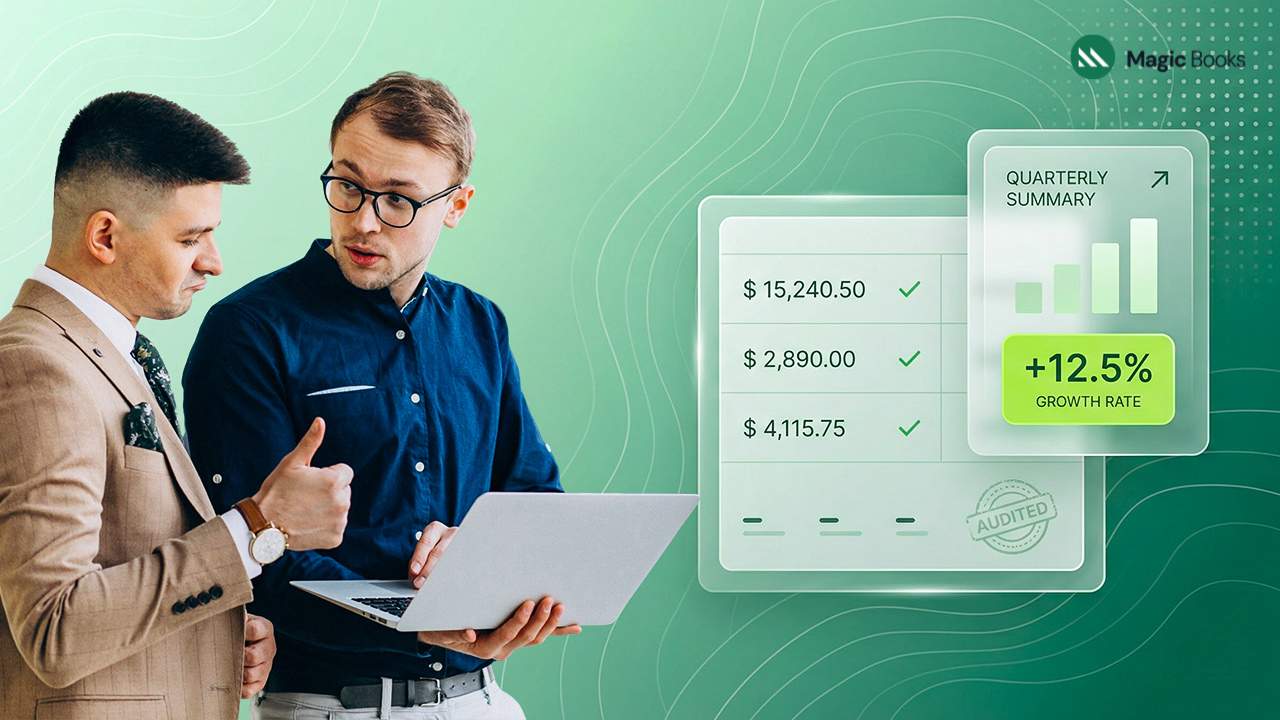Lets us paint a picture for you:
ABC, a developing analytics platform attracts clients from all around the world, is attracting a lot of clients from all around the world. They are also rapidly increasing their operations. Yet with so much good news on the horizon, there is still one thing that’s holding them back: managing their finances. There is a client located all over the world and they do international transactions from different time zones which can be a headache. Each section of the business has its own version of financial data stored in google sheets or excel sheets. Every team is spending hours collecting, pursuing payments and tracking bills for the finance team.
By the end of this paragraph, you must have felt sweat bead over your forehead, breathlessness and fatigue. If that’s the case, you are not alone.
In situations like this, Cloud accounting comes in as the best friend.
You want to know how?
Let’s dive in!
Just like its name, cloud accounting simply takes all the financial processes off to the cloud. Everything is hosted online and accessed from any device connected with the internet. This way your financial team can access every financial data there is for your business and everyone has real time access to the same data.
This entire methodology is a huge game changer. For example: In ABC company, a balance sheet and invoices seen by the financial team in New York would be readily available to an operations manager in London.
But, what’s so special about cloud accounting if it’s just a storage space?
Cloud accounting automatically renders repetition in task such as invoicing, expense tracking and reconciliation. Not only that but it can also integrate other tools such as CRM, payroll software etc. This makes sure that every aspect of the business is in sync.
What about the traditional accounting method? Is it not doing the job well? Is it not getting things done?
Here’s how traditional accounting compares with cloud accounting:
| Feature | Traditional Accounting | Cloud Accounting |
| Access to data | Restricted to one device | Available from any device |
| Real-time collaboration | None, manual data sharing | Instant, real-time updates |
| Cost | Upfront installation costs | Pay-as-you-go, scalable |
| Data security | Dependent on local machine | Encrypted cloud backups |
| Automation | Limited or manual | AI-driven automation |
Limitations of Traditional Accounting
How Does Cloud Accounting Work?
Now that you know why cloud accounting is a must, let’s break down how it works.
Cloud accounting stores your data on secure, remote servers which are managed by your cloud accounting provider. This means your financial data is safe, backed up, and accessible from any location.
Step 1: Data Entry and Automation
Cloud accounting automatically syncs with your bank accounts. So, whenever a transaction takes place, whether it’s a client paying an invoice, a subscription fee being deducted, or a tax payment, the data is recorded automatically and categorized in your accounting system.
Step 2: Real-Time Reporting
In cloud accounting, as we mentioned earlier, all financial data is updated in real time. This helps CFOs in the organizations to pull up all the profit and loss statements, cash flow reports and balance sheets with just a few clicks, all based on the most recent data.
Step 3: Integration with Other Systems
The best part of using cloud accounting is the fact that it can integrate with multiple business tools. Lets say your company is using a CRM system to manage your client relationships, it will be really helpful to have cloud accounting integrated with it. This means that as soon as a client signs up for a subscription, their invoice is automatically generated and sent. Payments are tracked, and the data flows back into the CRM to update the client’s profile.
Step 4: Data Security and Backup
When it comes to money, the conversation about security starts to take the front seat. Luckily, cloud accounting provides a really high level security system which includes two factor authentication, encryption and regular backups.
Why Should You Move to Cloud Accounting?
Let’s explore some top benefits that make cloud accounting a no-brainer:
1. Automation:
Oh Automation, how can we forget you? It’s the secret sauce behind cloud accounting. Automation takes over the repetitive tasks like data entry, tax filing and compliance checks. This helps in human error reduction.
No more accidentally entering a $10,000 payment instead of $1,000.
2. Cost-Effective:
Usually, traditional accounting software requires a significant investment upfront. This means, you have to pay for the license, installation and maintenance. On top of that, several upgrades that can add to your cost. However, cloud accounting operates on subscription model. You pay the monthly/annual fee, which is usually scalable depending on the size of the company.
3. Fort Knox Security:
All the financial data on a cloud? That can raise a few eyebrows when it comes to security concerns. But let’s be honest, wouldn’t it be safer to have all the data in an encrypted cloud system than on premises, which can be less safe? Usually cloud accounting offers layers of protection, including multi step authentication an regular backups.
4. Scalability:
As you expand your business, you need to be bogged down by having to install new software for each new location. Cloud accounting scales with your organisation. It can easily add new users, departments or features without needing to buy additional server space, hardware or licenses.
This flexibility allows them to grow without the growing pains.
From the perspective of companies such as ABC and XYZ, it lifts them out of the inefficiencies and frustrations associated with conventional financial management to streamline and automate it-in line with your business growth.
Accounting systems that were developed in the old days, accounting software, or even doing the job manually need a change. Actually, what is necessary to survive the fast-moving B2B SaaS world is flexibility, low cost, and other benefits of the cloud.
And as you assume that shift, remember: cloud accounting is no fad. It is a new future in the management of financial resources.



